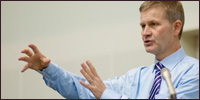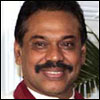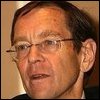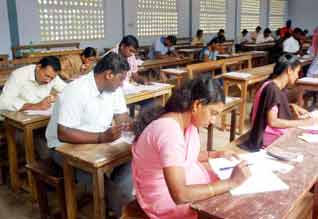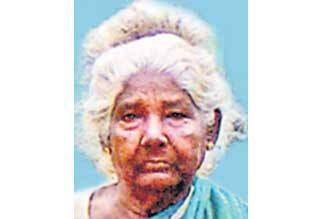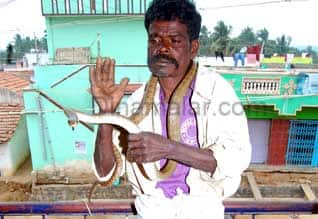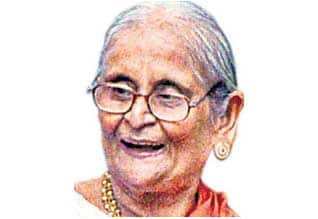Dublin tribunal takes up genocide investigation
[TamilNet, Saturday, 03 November 2012, 01:22 GMT]“In April 2013, a panel of international experts will be convened as Judges of the 'Permanent People's Tribunal' to examine reports submitted by many specialised working groups on the accusation of the crime of Genocide against the Government of Sri Lanka and on the accusations against various international actors who had supported and prepared the conditions for the Sri Lankan Government to implement this alleged crime,” said a joint statement issued by the 'Permanent People's Tribunal' (PPT) based in Rome on Friday. The move is supported organisationally by the 'Irish Forum for Peace in Sri Lanka' (IFPSL) based in Dublin and the International Human Rights Association based in Bremen (IMRV). Dublin Tribunal was the first independent international undertaking that recognised the need to look into the case of genocide in the island as early as in January 2010.
Full text of the press statement follows:
Dublin Tribunal Follows Up on Genocide and International Complicity
The People’s Tribunal on Sri Lanka-Session II
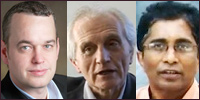
[L-R]
Nicolai Jung of IMRV (Germany), Gianni Tognoni of PPT (Rome) and Jude
Lal Fernando IFPSL (Dublin) announce genocide investigation in a joint
statement on 02 Nov 2012
This possibility has become a necessity now, due to the mass of new evidence (substantial, quantitative and qualitative) that has come to light since then. At the time we held the 'Dublin Tribunal', the real casualty figures remained largely hidden. The official UN figure did not exceed 8000 civilian casualties, while some of the British and French press carried reports estimating the total number of casualties at 'up to 20,000'. In fact, the Sri Lanka Government maintained a position of ‘zero civilian casualties’ for the full period of the final military offensive!
However, soon after the Dublin Tribunal, like a dam bursting, details of terrible atrocities and a more realistic estimation of the magnitude of the massacre started surfacing in media. The effective embargo in the international media that existed during the eight months of the military offensive – which had helped to prevent a humanitarian opposition to the war to emerge – was starting to break down, eight months after the end of the military project. One month after the Tribunal - in February 2010 - appearing on Australia’s ABC Television, the former UN spokesman in Sri Lanka Gordon Weiss contradicted the UN estimate of 'no more than 8,000 casualties' stating that ‘anything between 10,000 to 40,000’ civilians may have died during the final siege. Sometime later the Experts’ Panel appointed by the UN Secretary General used the 40,000 figure as its own estimate. On January 2011, the Catholic Bishop of Mannar made a submission to the Sri Lankan Government's own 'Lessons Learnt and Reconciliation Commission' (LLRC) that according to his calculation, 146,679 people are unaccounted for (he used the Government's own statistics to show this).
It is clear that the difference between estimate of 8,000 to an estimate of 146,679 is a significant one. The casualty figure issue is just one factor – which we have highlighted to emphasise our point. Various other factors - such as an examination of the historical background which had laid the basis to the events that led to the military operations in 2009, as well as, whether or not the continuing issues that the Tamil people in the area concerned are facing at the moment are related to this history, needs to be carried out properly to deal with the overall reality.
Due to the fact that substantial, quantitative and qualitative new evidence has become available, we believe that there are compelling reasons to organise a follow up to the 'People's Tribunal on Sri Lanka' to examine the case of Genocide against the Tamil people.
In April 2013, a panel of international experts will be convened as Judges of the 'Permanent People's Tribunal' to examine reports submitted by many specialised working groups on the accusation of the crime of Genocide against the Government of Sri Lanka and on the accusations against various international actors who had supported and prepared the conditions for the Sri Lankan Government to implement this alleged crime.
This follow on session of the People's Tribunal on Sri Lanka (PTSL) will be held in Germany under the auspices of the 'Permanent People's Tribunal' (PPT) based in Rome and supported organisationally, by the 'Irish Forum for Peace in Sri Lanka' (IFPSL) based in Dublin and the International Human Rights Association based in Bremen (IMRV).
2. November. 2012
Gianni Tognoni, Secretary General, Permanent People’s Tribunal (PPT), Rome
Jude Lal Fernando, Irish Forum for Peace in Sri Lanka (IFPSL), Dublin
Nicolai Jung, International Human Rights Association (IMRV), Bremen e.V
Contact: irishpeaceforum@gmail.com

